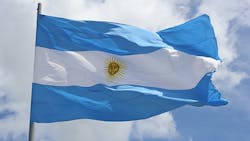US, Japan Drag Argentina to WTO over Trade Curbs
The United States and Japan have filed separate disputes at the World Trade Organization against Argentina, alleging illegal import restrictions, the trade arbiter said Tuesday.
The disputes were lodged independently with the WTO's Geneva-based secretariat, a spokesman said.
According to the U.S. and Japan, Argentine measures "restrict imports of goods and discriminate between imported and domestic goods," the spokesman added.
Their call for consultations "gives all parties an opportunity to discuss the matter and to find a satisfactory solution without proceeding further with litigation," he said.
After 60 days, if the dispute is not resolved, complainants may request adjudication by a WTO panel.
Rule are Unclear
Washington said Buenos Aires was specifically making broad use of often unclear import licensing rules "that have the effect of unfairly restricting U.S. exports."
Moreover, the office of the U.S. Trade Representative said, Buenos Aires was demanding that Argentine importers of goods from the U.S. also export similar amounts of Argentine goods.
Buenos Aires lashed out at the accusations, saying it planned to file its own WTO complaint against the United States for impeding imports of meat and fruits from Argentina.
Argentina Points to Beef, Citrus
"Argentina will present a report at the World Trade Organization against the United States for blocking, in violation of WTO rules, the import of Argentine beef and citrus fruits," the foreign ministry said in a statement.
On May 25, the European Union also requested consultations with Argentina on the issue of import restrictions.
Neither party has requested that matter be taken further for now, but Argentina subsequently approached the WTO on Aug. 17 for consultations on biodiesel import restrictions, specifically against Spain.
"Argentina claims that Spain put in place a regulation in April that in effect discriminates against biodiesel imports from Argentina in favor of those produced in the European Union. This, Argentina claims, would put the Argentine product completely out of the market," the WTO said in a statement.
Copyright Agence France-Presse, 2012
About the Author
Agence France-Presse
Copyright Agence France-Presse, 2002-2025. AFP text, photos, graphics and logos shall not be reproduced, published, broadcast, rewritten for broadcast or publication or redistributed directly or indirectly in any medium. AFP shall not be held liable for any delays, inaccuracies, errors or omissions in any AFP content, or for any actions taken in consequence.
